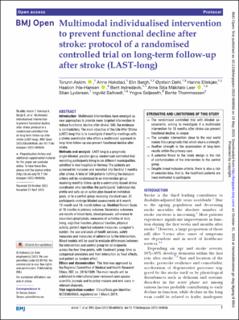| dc.contributor.author | Askim, Torunn | |
| dc.contributor.author | Hokstad, Anne | |
| dc.contributor.author | Bergh, Elin Josefina | |
| dc.contributor.author | Døhl, Øystein | |
| dc.contributor.author | Ellekjær, Hanne | |
| dc.contributor.author | Ihle-Hansen, Håkon | |
| dc.contributor.author | Indredavik, Bent | |
| dc.contributor.author | Leer, Anne Silja Mäkitalo | |
| dc.contributor.author | Lydersen, Stian | |
| dc.contributor.author | Saltvedt, Ingvild Tina | |
| dc.contributor.author | Seljeseth, Yngve Müller | |
| dc.contributor.author | Thommessen, Bente | |
| dc.date.accessioned | 2023-11-10T13:31:54Z | |
| dc.date.available | 2023-11-10T13:31:54Z | |
| dc.date.created | 2023-05-30T12:50:42Z | |
| dc.date.issued | 2023 | |
| dc.identifier.citation | BMJ Open. 2023, 13, e069656 | en_US |
| dc.identifier.issn | 2044-6055 | |
| dc.identifier.uri | https://hdl.handle.net/11250/3101942 | |
| dc.description.abstract | Introduction
Multimodal interventions have emerged as new approaches to provide more targeted intervention to reduce functional decline after stroke. Still, the evidence is contradictory. The main objective of the Life After Stroke (LAST)-long trial is to investigate if monthly meetings with a stroke coordinator who offers a multimodal approach to long-term follow-up can prevent functional decline after stroke.
Methods and analysis
LAST-long is a pragmatic single-blinded, parallel-group randomised controlled trial recruiting participants living in six different municipalities, admitted to four hospitals in Norway. The patients are screened for inclusion and recruited into the trial 3 months after stroke. A total of 300 patients fulfilling the inclusion criteria will be randomised to an intervention group receiving monthly follow-up by a community-based stroke coordinator who identifies the participants’ individual risk profile and sets up an action plan based on individual goals, or to a control group receiving standard care. All participants undergo blinded assessments at 6-month, 12-month and 18-month follow-up. Modified Rankin Scale at 18 months is primary outcome. Secondary outcomes are results of blood tests, blood pressure, adherence to secondary prophylaxis, measures of activities of daily living, cognitive function, physical function, physical activity, patient reported outcome measures, caregiver’s burden, the use and costs of health services, safety measures and measures of adherence to the intervention. Mixed models will be used to evaluate differences between the intervention and control group for all endpoints across the four time points, with treatment group, time as categorical covariates and their interaction as fixed effects, and patient as random effect.
Ethics and dissemination
This trial was approved by the Regional Committee of Medical and Health Research Ethics, REC no. 2018/1809. The main results will be published in international peer-reviewed open access scientific journals and to policy-makers and end users in relevant channels. | en_US |
| dc.language.iso | eng | en_US |
| dc.publisher | BMJ Publishing Group | en_US |
| dc.rights | Navngivelse-Ikkekommersiell 4.0 Internasjonal | * |
| dc.rights.uri | http://creativecommons.org/licenses/by-nc/4.0/deed.no | * |
| dc.title | Multimodal individualised intervention to prevent functional decline after stroke: protocol of a randomised controlled trial on long-term follow-up after stroke (LAST-long) | en_US |
| dc.title.alternative | Multimodal individualised intervention to prevent functional decline after stroke: protocol of a randomised controlled trial on long-term follow-up after stroke (LAST-long) | en_US |
| dc.type | Peer reviewed | en_US |
| dc.type | Journal article | en_US |
| dc.description.version | publishedVersion | en_US |
| dc.source.pagenumber | e069656 | en_US |
| dc.source.volume | 13 | en_US |
| dc.source.journal | BMJ Open | en_US |
| dc.source.issue | 5 | en_US |
| dc.identifier.doi | 10.1136/bmjopen-2022-069656 | |
| dc.identifier.cristin | 2150165 | |
| cristin.ispublished | true | |
| cristin.fulltext | original | |
| cristin.qualitycode | 1 | |

